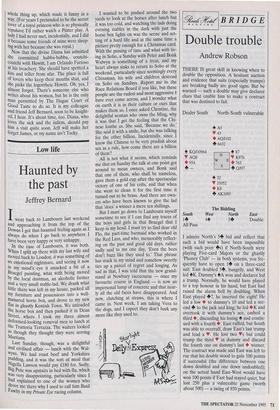MADEIRA
BRIDGE
Double trouble
Andrew Robson
THERE IS great skill in knowing when to double the opposition. A hesitant auction and evidence that suits (especially trumps) are breaking badly are good signs. But be warned — such a double may give declarer clues that enable him to make a contract that was destined to fail.
Dealer South North-South vulnerable
The Bidding
South West North East 1+ 44 5+ Double All Pass I admire North's 54 bid and reflect that such a bid would have been impossible (with such poor +s) if North-South were playing Five-card Majors or the ghastly `Phoney Club' — in both systems, you fre- quently have to open 1+ on a three-card suit. East doubled 5+, hungrily, and West led 4K. Dummy's 4A won and declarer led a trump. Normally, he would have played to a top honour in his hand, but East had raised the alarm bell by doubling. When East played +7, he inserted the eight! He led a low • to dummy's 10 and led a sec- ond 4 to the jack and king; he led •K and overtook it with dummy's ace, cashed a third •, discarding his losing 4 and contin- ued with a fourth •. East ruffed, but South was able to overruff, draw East's last trump and lead a V. He lost two Vs but could trump the third V in dummy and discard the fourth one on dummy's last • winner. The contract was made and East was left to rue that his double stood to gain 100 points if successful (the difference between one down doubled and one down undoubted); on the actual hand East-West would have won 100 points if East had stayed quiet, but lost 250 plus a vulnerable game (worth about 500) — a swing of 850 points.


















































































 Previous page
Previous page